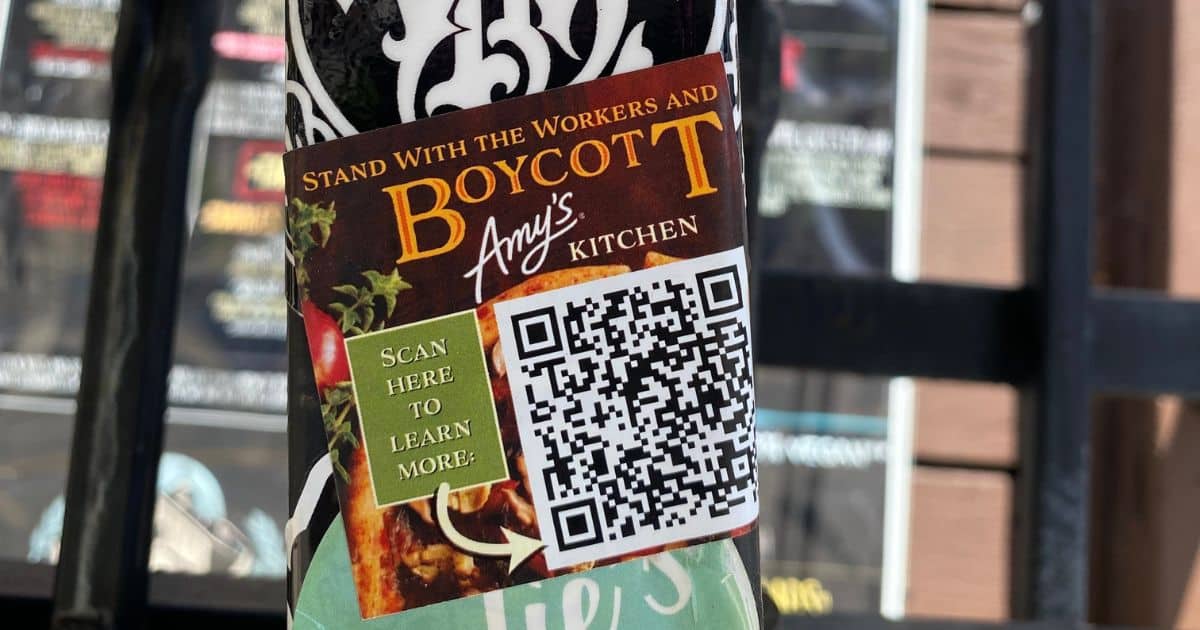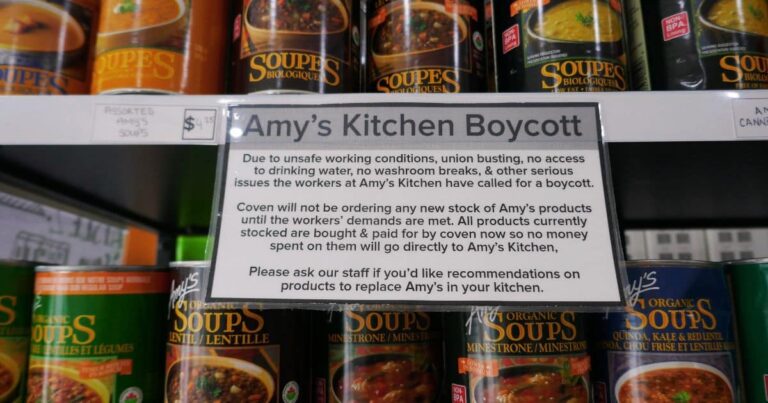On June 12, employees at Amy's Kitchen called for an end to a two-year boycott of the company's products. The boycott, which was launched with the backing of the vegan organization Food Empowerment Project, has continued thanks to the support of shoppers across the country. Several grocery stores in California and Oregon have removed Amy's products from their shelves, according to the Food Empowerment Project.
Organizers say the boycott is a response to poor working conditions at Amy's manufacturing plants. “We wanted to make our demands and voices heard at Amy's Kitchen,” Cecilia Luna Ojeda, who has worked at Amy's for 20 years, told Sentient in an email. “We felt this boycott was an important call to action.”
Workers and management agree on change
Amy's kitchen production workers initially called for a boycott in 2022, but it was only in the past eight months that company management agreed to negotiate. “It took a long time to hold the meeting because we had to agree on how to hold the meeting,” says Lauren Ornelas*, who runs the Food Empowerment Project. Part of the problem was that Amy's management was hesitant to meet with workers in person.
After months of back and forth, the nonprofit, the companies and their employees finally met, which included interpreters present for non-English speaking employees and assurances that no one would lose their jobs as a result of organizing.[The workers like Ojeda] “They were speaking to the people who decide whether they have a job or not, and they spoke very forcefully and with strong conviction about how they want to be treated,” Ornelas says of the meeting with Amy's. “We put all of our concerns and truths about our jobs on the table, and they listened to our demands for improved working conditions and committed to making lasting change for workers,” Ojeda writes.
After months of back-and-forth and years of boycotts, an informal agreement was finally reached between workers and employer, promising higher wages and safer working conditions. Going forward, the company will provide translators at its production facilities to help workers better understand and access their benefits. Amy's also agreed not to hire labor-relations consultants in the future, Ornelas said.
“This collaboration has fostered productive discussions about how we can better serve our employees' needs and enhance our communication,” Paul Schieffer, president of Amy's Kitchen, said in a joint statement with the Food Empowerment Project. “We look forward to continuing this positive dialogue and making meaningful improvements for our employees.” Sentient reached out for further insight but did not receive additional comment.
Persistence led to successful negotiations


Before agreeing to the meetings, Amy's Kitchen tried classic union-busting tactics at its San Jose, California facility (which is closing in 2022), including firing workers who complained.
Persistent workers like Ojeda continued to risk their lives for better working conditions, only backing out when the company finally agreed to certain demands. “My colleagues and I decided to end the boycott because Amy’s Kitchen is committed to improving workplace health and safety, raising wages, and respecting the dignity of workers,” Ojeda told Sentient.
Ornelas says that if the company fails to keep these promises and workers call for a boycott, the Food Empowerment Project is prepared to help restart the boycott. “We don't need anything to restart the campaign,” she notes. If workers decide the company can't be trusted, she says, she would support a permanent boycott of its products.
While Ojeda and other organized laborers were successful in reaching an agreement with their employer, some workers at Amy's Kitchen were not on board with the movement. “The workplace was divided at the time,” she says. “But many workers wanted improvements, and our voices needed to be heard.”
Broader organizing helped maintain public support
Because Amy is a privately held company, it's impossible to know how big an impact the boycott has had on the company's bottom line, but union organizers can gauge engagement with the various tactics the campaign used to achieve its goals.
To support the boycott, the Food Empowerment Project created stickers that read, “Stand with Workers and Boycott Amy's Kitchen,” and distributed them with a QR code that linked to the campaign's webpage. The stickers, which were also available on the nonprofit's website, were ordered more than 300 times by people in more than 15 states and Canada. In total, the group distributed more than 3,800 stickers. The Food Empowerment Project encouraged recipients to place the stickers on water bottles or electronic devices, but Ornelas said many of them were placed on Amy's Kitchen products at grocery stores.
Some stores have decided to pull Amy's Kitchen products from their shelves entirely, including several grocery co-ops, including several in California and Oregon. “We had meetings with a lot of the co-ops where the employees and I could talk,” Ornelas said, “so the co-ops could hear from the employees themselves.”
For Ornelas, the campaign is a great example of what vegans and other social justice advocates can accomplish together. “I think it was hard for a lot of vegans to give up Amy's during the boycott,” she says. Now that the boycott is over, Ornelas says it's great to see vegan supporters naming “favorites they'd like to buy again.”
Editor's note: We've spelled Lauren Ornelas' first name the same way she does.


